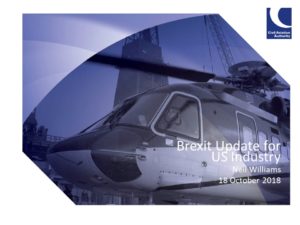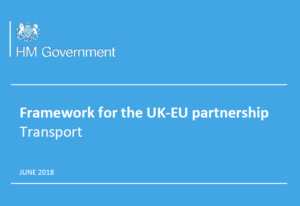Brexit
On June 23, 2016, citizens of the United Kingdom voted to withdraw from the European Union in a national referendum. Fifty-two percent of voters voted for the UK to “leave” the political and economic union joining it to 27 other member states.
This page is provided as a resource for the aviation maintenance community. It will provide key aviation updates – when necessary – regarding transition negotiations between the British government and the European Commission. It also contains a list of resources useful for finding more information.
Note: Through its newsletters and other communications, ARSA has provided basic instruction for businesses to manage Brexit-related regulatory matters. Members with specific questions should contact the association.
Key Timeline:
November 2023: New ARSA Cross-Reference Matrices for Compliance with U.S./UK MAG
ARSA’s new cross-reference matrices are available for U.S.-based repair stations looking to show compliance with the special conditions established under the bilateral agreement between the United States and the United Kingdom.
Click here for more information.
December 2022: FAA and UK CAA Statement on Ending of “Special Agreement”
On Dec. 8, the FAA and UK CAA issued a join statement confirming the January 2023 termination of the Special Arrangement for Continuity in Aircraft Certification Projects.
To read the statement, click here.
November 2022: FAA Instructs Potential Repair Station Applicants for UK Approval
On Nov. 15, the FAA hosted a webinar on the Maintenance Implementation Procedures (MIP) and Maintenance Agreement Guidance (MAG) established between the United Kingdom (UK) and United States (US). The agency will begin accepting applications for UK approval of US-based repair stations on Jan. 1, 2023; approval must be held to perform work subject to British rules by the beginning of 2025.
August 2022: UK CAA and FAA agree to continue MIP beyond 2022
The existing procedures were agreed between the UK and the USA in January 2021, which allowed for the continuation of maintenance organisation approvals between the UK and the USA post-EU Exit until 31 December 2022. These will now be extended beyond the end of the year.
The industry does not need to take any action prior to 31 December 2022 as there will be an implementation period for the new procedures.
Click here to see the source release from the UK CAA’s Skywise communications system.
November 2021: UK CAA Webinar on Acceptance of EASA Form 1
On Nov. 4, the UK CAA delivered a webinar explaining it will extend its acceptance of EASA Form 1 for UK-registered aircraft through March 2022 (ninety-days) from EU countries; after that the maintenance provider must obtain a UK CAA approved maintenance organization certificate. To download materials from the session, click here.
Companies located in the United States should refer to the Maintenance Agreement Guidance signed in December 2020 by the FAA and UK CAA; those in other states should refer to their CAA for a bilateral or working arrangement with the United Kingdom.
August 2021: UK CAA and FAA Release “Special Arrangement” Session Materials
On Aug. 5,the FAA and and UK CAA released the presentation materials associated with the agencies’ public outreach session covering their “Special Arrangement for the Continuity of Aircraft Certification Projects.”
May 2021: UK CAA and EASA Agree to Technical Implementation Procedures
The TIP gives both agencies oversight of the Air Safety Agreement that was signed between the UK and EU in December 2020 and sets out the measures the aerospace sector must take in order to design and produce new aerospace parts moving between the two political jurisdictions.
Click here for more information from the UK CAA website.
January 2021: EASA Updates Parts Documentation Table
On Jan. 29, EASA updated its Parts Documentation Table to add the United Kingdom to the list of covered regulatory systems. The table sets forth the required documentation for installing a component and approving it for release to service under EASA Part-145.
December 2020: Releasing UK-registered Aircraft for Service
To ensure aircraft registered in the United Kingdom can be approved for return to service by EASA-approved part 145 certificate holders, the U.K. CAA issued Decision No. 3. The decision follows the requirements of a 2013 EASA regulatory interpretation requiring the “foreign authority” affirmatively state that an EASA part 145 certificate holder release is acceptable.
December 2020: FAA Presents US-UK Implementation Procedures
On Dec. 2, the FAA presented updates regarding maintenance and airworthiness agreements between the United States and the United Kingdom that will become effective on Jan. 1, 2021. Read a review of the agencies’ implementation plans – originally posted as a “Legal Brief” in the edition of the hotline distributed on Dec. 7, 2020 –via the association’s website.
February 2020: TCCA and UK CAA Exchange Letters Confirming UK Adherence to EU Obligations & Procedures
Letter from UK CAA to TCCA, Feb. 10, 2020
Letter from TCCA to UK CAA, Feb. 20, 2020
January 2020: FAA Assures “No Change” in Immediate Brexit Aftermath
On Jan. 30, FAA Associate Administrator for Aviation Safety Ali Bahrami distributed a letter to the aviation community regarding the forthcoming departure of the United Kingdom from the European Union. Citing several years of effort between U.S. and British regulators, Bahrami affirmed that the political separation will have no immediate impact on transatlantic aviation business.
August 2019: Update on Aviation Parts-related Issues Stemming from Brexit
“Complex Part Transactions Could Be Endangered By No-Deal Brexit”
The selection of Boris Johnson as Conservative prime minister alters somewhat, but perhaps not decisively, the prospects for Brexit, according to Jason Dickstein, aviation lawyer and president of the Modification and Replacement Parts Association (MARPA). Regulators and aftermarket companies have been preparing for Brexit for a awhile, but Dickstein thinks some essential MRO and part transactions are still vulnerable to interruption.
Click here to read the piece via MRO Network.
April 2019: Deadline Extension to October 2019
“Brexit: UK and EU agree delay to 31 October”
European Union leaders have granted the UK a six-month extension to Brexit, after late-night talks in Brussels. The new deadline – 31 October – averts the prospect of the UK having to leave the EU without a deal on Friday, as MPs are still deadlocked over a deal.
Click here to read coverage from the BBC.
March 2019: From the UK CAA – U.S. MIP Signed
On March 14, the Civil Aviation Authority of the United Kingdom posted details of new implementing procedures agreed to under the bilateral aviation safety agreement (BASA) between the UK and the United States.
January 2019 Media Reports
“May suffers heaviest parliamentary defeat of a British PM in the democratic era”
MPs vote down EU withdrawal agreement in resounding defeat for prime minister.
Click here to read and access expanded coverage from the Guardian.
“Europe Prepares Limited Reprieve for UK Aviation”
One of the measures proposed by the European Commission is extending the validity of type certificates by nine months.
Click here to read coverage from MRO Network.
November 2018 (More in November edition of the hotline)
After months of negotiations, officials from the European Union (EU) and the UK unveiled a draft Brexit deal in November. It includes a 585-page withdrawal agreement (a legally-binding text that sets the terms of the UK’s departure from the EU) and a 26-page, non-binding statement on future relations explaining the shared vision for the UK’s future involvement in the EU.
October 2018 Briefing by UK CAA: Brexit Update for U.S. Industry
October 2018 Media Report: “EASA Updates Brexit Notice To Prepare for No-deal Scenario”
With the UK’s exit from the European Union now less than six months away, the European Aviation Safety Agency has begun putting in place what it describes as “preparedness measures” and said it will start to process “some applications” for third-country approvals from existing UK approval holders.
Click here to read coverage from AIN Online.
June 2018 “Framework for the UK-EU Partnership (Transportation)”
This presentation is part of a series produced by the UK negotiating team for discussion with the EU, in order to inform the development of the future framework. It focuses on an element of the vision for our future relationship set out by the Prime Minister. The future framework will set out the terms of the political entities’ future relationship, to be translated into legally binding agreements after the UK’s withdrawal.
April 2018 EC “Notice to Stakeholders”
On April 13, 2018, the European Commission’s Directorate-General for Mobility and Transportation issued a notice on the “Withdrawal of the United Kingdom (UK) and EU Aviation Safety Rules.”
The notice explains that unless a withdrawal agreement establishes a different timeline or other rules, on March 30, 2019 all EU laws will cease to apply in or to the UK, including those related to civil aviation safety. Among the potential consequences:
- EASA carries out the functions and tasks of the state of design on behalf of EU member states. This includes the issuance of type certificates for products, design approvals for parts and appliances and design organization approvals. Such approvals issued by EASA to persons and organizations located in the UK will no longer be valid in the EU.
- Certificates issued by the UK pursuant to EU rules (including airworthiness, approved maintenance organization, maintenance training organization, manufacturing, and mechanic certificates) will no longer be valid.
- Certificates confirming compliance with EU rules issued before the withdrawal date by persons certificated by the UK pursuant to EU rules will no longer be valid (with some limited grandfathering exceptions).
- UK aircraft operators will be considered ‘third country’” operators by the EU and require an authorization from the EASA.
- EU aircraft operators using UK-registered aircraft will need to comply with EU rules on air services concerning the use of ‘third country’ registered aircraft.
Individuals, as well as organizations located in the UK holding certificates who wish to continue EU activities will need to ensure compliance with EU aviation safety requirements. The notice also states that the Commission is considering whether any additional steps or guidance are needed to facilitate compliance for products, parts and appliances certificated before the withdrawal date and put in use in the EU before the withdrawal date and/or relevant organizations or persons requiring certification.
The Commission’s notice sets forth the worst-case scenario. Aviation safety is a key issue in Brexit negotiations and policymakers on both sides of the English Channel will look for ways to avoid massive disruptions. A UK government report states that the UK and the EU are working to pave the way for the UK to continue participating in EASA through the end of 2020.
As for the longer-term future, the UK could become an “associated” country for purposes of EASA, the status enjoyed by Iceland, Liechtenstein, Norway and Switzerland (European countries but not EU members). According to the FAA, associated countries can enter into bilateral agreements with third countries (as long as they don’t contradict EASA’s interest). The UK could therefore conclude separate bilaterals with the United States to minimize headaches for companies doing business between the two countries.
Before you take the EC’s notice as gospel, visit EASA’s webpage for additional perspectives on the Brexit negotiations and links to other EU and UK resources.










